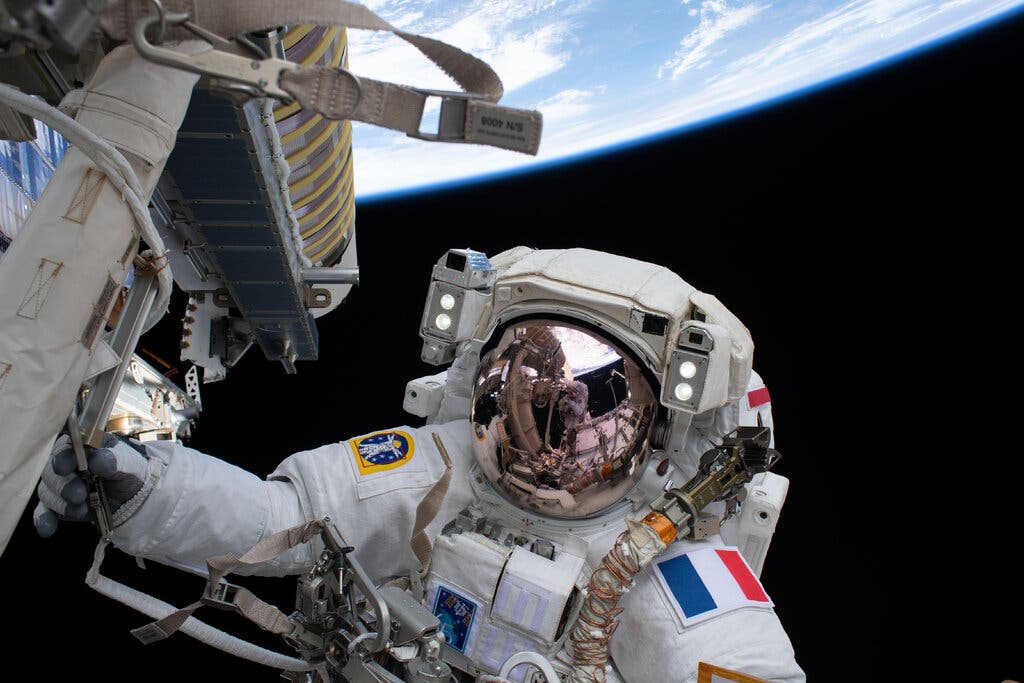Space agency authorities postponed a Tuesday spacewalk for two of the agency’s astronauts late Monday night after receiving reports that surrounding space debris may threaten the crew. Following the explosion of one of Russia’s ageing satellites in orbit earlier this month, the International Space Station’s operations have been subject to a series of sudden changes.
At 7:10 a.m. Eastern time on Tuesday, Tom Marshburn and Kayla Barron, two U.S. astronauts who arrived at the orbiting outpost earlier this month, were planned to wear their spacesuits and climb the outside of the space laboratory. Their objective, which took around six hours, was to repair a communications antenna that had failed.
The United States Space Command, which keeps track of thousands of objects in orbit, warned a NASA flight director at the agency’s Johnson Space Center in Houston on Monday evening of a potential space debris concern. In a statement released early Tuesday morning, NASA said that the spacewalk had been cancelled “due to a lack of time to appropriately analyse the danger it potentially represent to the astronauts.”
A NASA spokesman, Gary Jordan, said in an email that the agency completed its risk assessment on Tuesday afternoon and determined that Thursday would be the best day to conduct the spacewalk. Mr. Jordan, on the other hand, was unable to identify whether the debris was associated with the Russian anti-satellite missile test, stating that “there is not enough information available at this time to further define the debris.”
The delay comes only two weeks after Russia destroyed a decommissioned Soviet-era spacecraft with an antisatellite missile, resulting in thousands of untraceable shards of debris that might linger in orbit for decades. The expanding field of dangerous space debris has generated new hazards to the International Space Station and may put other spacecraft in orbit in danger.
NASA astronaut Mark Vande Hei, who is now stationed on the International Space Station, spoke with mission control in Houston on Monday after waking up to an email informing him that the spacewalk had been cancelled.
After hearing Mr. Vande Hei’s announcement over the ground-to-space line, a NASA official in Houston responded, “Sorry for the bad news.” “I’m sure we’re nearly as unhappy as the crew members today, but I understand that waking up to this news is a little bit more difficult for you guys today.”
In the aftermath of the Russian satellite attack, the first debris cloud got perilously near to the International Space Station, which was housing a crew of seven astronauts, including two Russians. An officer from NASA mission control in Houston awakened the agency’s astronauts shortly after the attack, telling them to seek cover in their spacecraft in case they needed to return to Earth. The men complied. Certain hatches on the station were remained locked for many days after the event, and they were only opened once the immediate risk had passed.
It was carried out by Russia’s Ministry of Defense at a time when tensions between the United States and Russia are at an all-time high, with officials in the United States warning allies that Moscow is establishing a military presence on its border with Ukraine. And the missile test came at a time when NASA is negotiating with Roscosmos, Russia’s space agency, to swap astronaut trips to the International Space Station on U.S. vehicles for seats on Russian Soyuz spacecraft, which would put the space station in greater danger. These kind of accords, according to officials from both nations, are critical to the continued running of the space station.
NASA’s deputy manager of the space station, Dana Weigel, said on Monday at a press conference that previewed the upcoming spacewalk: “There are around 1,700 new items, bigger things, that are being monitored.” Getting all of them catalogued and into our standard debris monitoring procedure will take many months, after which we will be able to determine miss distances and how near these pieces reach to the International Space Station.”
In her statement, Ms. Weigel said that the Russian weapon test more than increased the amount of the space station’s background debris environment. She said that the new field of debris increased the danger to astronauts doing spacewalks by around 7 percent. However, she said that the risk assessment “belongs to the same family” as previous risk calculations for spacewalks.
The spacewalk was postponed only one day before the White House will host the inaugural meeting of the National Space Council under Vice President Joe Biden’s administration. A letter sent to the Council on Foreign Relations on Monday by members of the Senate Commerce Committee urged Vice President Kamala Harris, who serves as the council’s chairwoman, to take action in response to the Russian anti-satellite test and “work to develop international dialogue on norms of responsible behaviour in space.”
This year, there have been a total of 12 spacewalks, several of which have resulted in the installation of new components and solar panels on the space station’s exterior. Subject to legislative permission, NASA wants to maintain the orbiting laboratory operational until 2030, which is 21 years old. Cracks and air leaks observed on a critical module of the station in 2019 indicate that the station is already showing indications of wear and tear.

